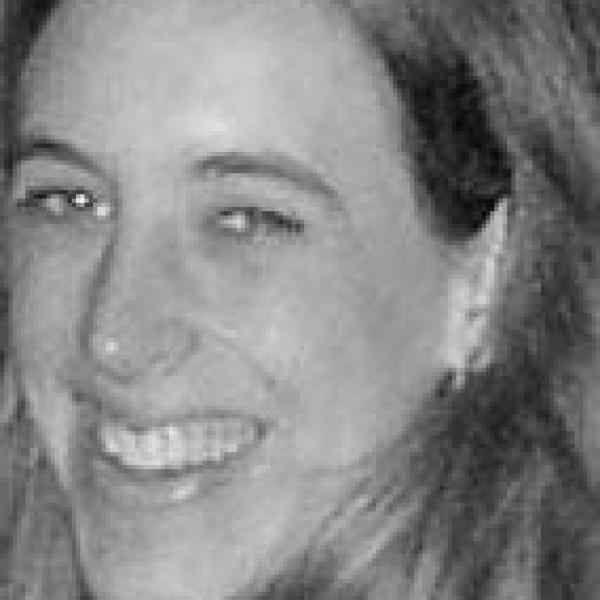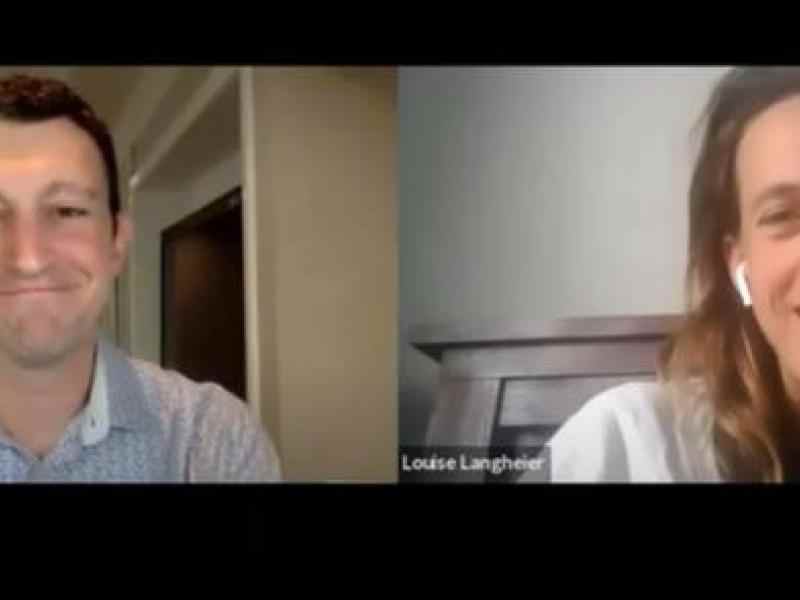Introduction
Louise Davis Langheier founded Peer Health Exchange to provide comprehensive health education to teens across the country through a network of volunteer peer educators.
The New Idea
Louise is working to incorporate comprehensive health education back into public schools in the United States so that teenagers have the knowledge and skills to make good decisions when facing health risks. She is co-founder of Peer Health Exchange (PHE), a network of health educators that runs workshops for 9th grade students in low-income schools where students experience a disproportionate number of dangerous health outcomes that threaten their educational success. Trained volunteers from local colleges lead the sessions across a range of topics—from sexual health to substance use to nutrition—and guide open discussions about these issues. Perhaps most important, the workshops teach students a set of decision-making and communication skills so they can apply what they learn in their many interpersonal relationships and effectively evaluate the implications of their decisions. PHE has become a model for how to promote healthy behavior among teens, and it is using its success to challenge conventional notions about the very role of our schools. PHE was founded in 2004 and now 17,000 teens are participating in PHE workshops across the country each year.
The Problem
Peer Health Exchange was founded to address a growing crisis among teenagers: they are engaging in risky behavior at alarming rates in ways that harm their bodies and their futures. The statistics are startling. One in four teenagers is a binge drinker and one in four smokes. One in three teen girls becomes pregnant. One in five teenagers experiences violence in a relationship. One in six teens is obese and nearly one in three is overweight. Not surprisingly, such statistics represent significant barriers to academic success, not to mention healthy development. Indeed, dangerous or unplanned health outcomes can derail teens and take them out of school altogether. Teenagers who engage in risky behavior today are less likely to stay and excel in school, join and remain part of the workforce, and become healthy adults capable of producing healthy families.
Once upon a time, public schools in the U.S. were committed to teaching health to high schoolers, but budget cuts and staff shortages have either paired down or shut down those efforts, leaving teens unprepared to protect themselves from health risks. Today, few districts are able to provide comprehensive, high-quality health education. These same students must contend with “negative norming” from their peers. When it comes to the health risks most likely to threaten their well-being and their futures, they are getting little to no positive guidance.
At a more systemic level, the problem involves society’s conception of the very role of public education. For the last two decades, in part because of funding and because of a growing focus on standardized testing, our public schools have been stripped of the types of learning that fall outside an increasingly rigid curriculum—including arts education, music, financial literacy, health and more. Primary schools across the country are even cutting out recess to make time for test prep. All of which begs the question: What is the purpose of education? Is it simply to impart knowledge or to provide a foundation for life? A student’s health is inexorably tied to his or her ability to succeed in school and beyond, and our schools are uniquely positioned to ensure that adolescents are making informed health decisions at a critical time in their lives. Their failure to do so is a major shortcoming and necessitates new thinking about the requirements of public education.
The Strategy
Louise founded PHE so that teens would be equipped to make the best decisions in the face of health risks. Her strategy is straightforward: Demonstrate the essential function of health education in a teen’s academic and life success, prove that comprehensive health can be taught effectively and systematically, and link with school districts across the country to begin shifting mindsets about the importance of health education. Central to the success of PHE is a network of well-trained college student volunteers and a comprehensive health curriculum that has been tested and continues to be refined.
PHE works with high schools that lack health education and in which the majority of the students live at or below the poverty line. These students experience a disproportionate number of serious health risks ranging from teenage pregnancy to obesity. PHE targets 9th graders because statistics show that it is the most risky year—with teens transitioning from middle to high school and exposed to older students. In fact, more teens drop out of school between 9th and 10th grade than any other year.
Once a partnership with a high school is formed, PHE recruits and trains volunteers from nearby colleges and universities. These volunteers get the benefit of making an immediate impact in the lives of teenagers in their communities. But the peer partnership is also strategic: As slightly older peers, PHE volunteers can teach in a language and context that is relevant to teenage experiences, and they can also serve as role models, demonstrating healthy behaviors and the successful transition from high school to college. Each volunteer instructor completes a minimum of 20 hours of training and is required to demonstrate mastery of the core material and excellence in classroom presence. Volunteers are assigned to teach a specific topical area (for example, pregnancy prevention) for which they typically lead seminars at several local schools. Those with several years of experience help train and evaluate newer recruits.
Thirteen workshops are held over the course of a semester with a teacher present in the classroom at all times. The topics include sexual health, relationships, substances, nutrition and physical activity, and mental health. The workshops are accompanied by a workbook full of information, illustrations, and exercises that reinforce the material. Each topic is covered in great depth and regularly refined and updated to remain relevant. For example, in the workshop on abusive relationships, time is devoted to “sexting” and its implications, a phenomenon that is particularly pervasive among teens today. No matter what the topic at hand, high school students are encouraged to articulate their values and goals, explore attitudes and perceptions of peer norms and peer pressure, analyze the influence of culture and the media on health, discuss barriers to healthy behaviors and strategies to overcome them, and identify and learn how to use the health resources in their communities. Students are also given a Peer Health Resource Card complete with a marked map of relevant health centers and free heath resources in their neighborhoods so the know where to go if they need anything from contraception to consultation.
Importantly, the workshops are designed to do more than simply throw information at teenagers. From the beginning, Louise’s goal with PHE was to enable teens to make informed, thoughtful decisions that would protect their bodies and futures. This is why the 11 topical workshops are framed at the start and end by decision-making and communication workshops. Students learn about effective communication, active listening, risk evaluation and prevention, pros and cons, limit setting and more, and then apply these skills in role-plays and scenarios that resemble difficult, real-life situations. From the first session, they are asked to identify goals they have in school and in life, and then work backwards from those goals to inform their decision-making. Teens emerge from the workshops, therefore, not only more knowledgeable about things like birth control and sexually transmitted disease, but also having practiced a set of life skills that they can rely on across the interpersonal relationships that will shape their lives, for better or worse. More than health education, then, PHE is providing a 21st century version of life-skills education for teens.
Since 2004 PHE has grown from serving a few dozen students in New Haven to more than 17,000 each year in New York, Boston, Chicago, Los Angeles, and the Bay Area. Initial data highlights the organization’s effectiveness, with 16 percent health knowledge improvement in pre-test to post-test and 86 percent of PHE high school students saying they already used something they learned in the workshops to make a healthier decision while the program ran. In addition, school support is very strong, with 96 percent of participating principals recommending the program to other schools, and with dozens of schools on waiting lists for PHE volunteers.
Over the next four years, PHE seeks to increase its impact dramatically. To do so it will focus on more robust measurement, deepening its impact on every teen, and developing and testing additional methods for impact on the overall system. PHE’s ultimate reach will not be dependent on the number of volunteers: Louise hopes to create a talent pipeline for health education. In time, strong health educators will be imbedded permanently in schools. Finally, Louise is increasingly working with education organizations to position PHE’s work as part of larger education reform efforts.
In 2011, Peer Health Exchange had a staff of 21, a 12-member board of directors, a cohort of 1,700 volunteers across its five cities, and an annual national budget of $12 million. More than $2.6 million has also been raised and set aside specifically for growth and expansion over the next several years.
The Person
Louise has been passionate about health for as long as she can remember. She grew up in San Francisco during the HIV/AIDS epidemic of the 1990s where she began volunteering as a 9th grader with Project Open Hand, a community organization that helped those living with HIV/AIDS, including by serving them meals. As a high school student, Louise remembers meeting other teenagers with HIV—connections that had a lasting impact on her. She recognized early on that unlike her, these teenagers did not have tools they needed to make good health decisions. Had they had the knowledge and tools to make those decisions, their life trajectories could have been radically different. This realization has guided Louise’s career ever since, and this empathy remains an underlying force throughout Peer Health Exchange.
As an undergraduate at Yale, Louise was committed to improving the university’s relationship with the surrounding community in New Haven—with the goals of both increasing community service and making it more effective. As a volunteer with a local high school where many Yale students would offer tutoring and academic mentorship, Louise and other Yale undergraduates spoke at length with a teacher there about how the volunteers could be more effective. What the students really needed, he told her, was health education. As slightly older peers, the teacher believed that college students were uniquely positioned to fill that void and make an immediate impact on teen lives. The idea for Peer Health Exchange was born.

 Tile image
Tile image